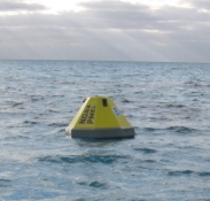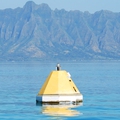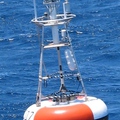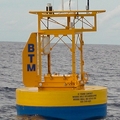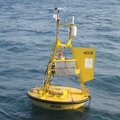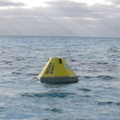Crescent Reef
Crescent Reef Bermuda (32.40°N, 64.79°W)
The PMEL carbon group is working with researchers at the Bermuda Institute of Ocean Sciences (BIOS) to better understand carbon dioxide variability on the Bermuda Pedestal. The benthic marine ecosystem of Bermuda is highly dominated by calcifying organisms including, for example, corals, coralline and calcifying algae, foraminifera, echinoderms, barnacles, bryozoans and many others that may be sensitive to ocean acidification. Together, we have deployed MAPCO2TM systems on buoys at Hog Reef (32.46°N, 64.83°W) and at Crescent Reef (32.40°N, 64.79°W) on the Bermuda Pedestal.
The coral reef ecosystem of Bermuda is a marginal reef owing to the relatively high latitude location of Bermuda. As a results, the Bermuda reef experiences relatively low sea surface temperatures (17-18°C) and low carbonate ion concentrations [CO32-] (a critical building block of the coral reef structure) in the winter time relative to its counterparts located at lower latitudes. It is important to study marine organisms and their response to ocean acidification in a variety of environmental conditions. This mooring will help us to better understand how changing ocean chemistry and climate may impact the Bermuda reefs. For more information about the mooring and meteorological sensors please visit the Bermuda Ocean Acidification and Coral Reef Investigation (BEACON) website.
Data availability: archived at NCEI.

